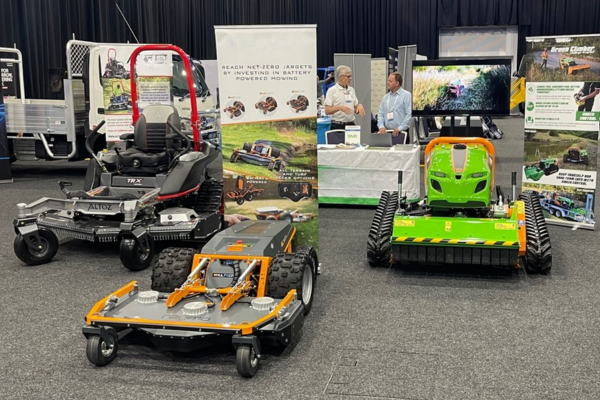Streamlining council fleet and plant operations
| Next Article |
Running efficient and effective fleet and plant equipment operations is one of the biggest yearly expenses for councils. Forward planning and supply chain management are more important than ever to ensure you can secure critical plant equipment to manage the whole-of-life costs and return on investment with these large capital assets.
With councils prioritising environmental and financial sustainability, using efficient processes and looking to future technologies, is imperative to ensure local government meets the needs of the communities they serve.
Many councils are looking to transition to electric or hybrid vehicles to help meet long-term environmental and emissions goals. Transitioning to renewable fuels and zero tailpipe emissions can also reduce financial impact by lowering running costs (i.e. reduction in fuel consumption and replacing an ageing fleet).
By setting clear sustainability goals and implementing targeted strategies, Queensland councils can make significant progress toward reducing the environmental footprint of their fleet operations while also demonstrating leadership in sustainability to the community.
Here are a few suggestions that can help streamline your fleet and plant operations:
- Assess fleet and plant operations – obtain a complete overview of your assets so you can develop a plan. Often an outside review can assist council to make the necessary changes.
- Utilisation of fleet management software – enabling the tracking of fleet assets, analysis of running costs, scheduled maintenance, management of risks and making informed decisions about asset utilisation.
- Plan for supply chain impacts – while supply chain issues are softening, be aware of delivery schedules, specifically in relation to budgetary spending. The supply chain has a number of trigger points that have been experiencing issues over the last three years; raw materials, parts supply, manufacturing, shipping and labour shortages are still impacting delivery times.
- Financial management –an analysis of whole of life cost elements can assist in reducing costs, improving operational efficiency, and enhancing the financial performance of your fleet operations.
- Planning – monitor asset replacement plans, review utilisation of assets, analysis of service levels provided by suppliers including whole of life costs.
- Align with council operational plans – government push to meet global emissions reduction targets requires a decrease of carbon emissions from fleet and plant. Asset life-cycle management and disposal, electrification, fleet efficiency, and consideration of alternative solutions need to be considered to meet council requirements.
- Safe working environment - The safety of workers is paramount and ensuring your fleet has modern safety equipment features to reduce risk of injury is essential. Consider fatigue management, fleet management systems, maintenance schedules, driver and operator training and emergency preparedness.
- Procurement of and disposal of assets - Local Buy Arrangements have been specifically designed in response to council feedback and cover a variety of services and suppliers relating to fleet management, procurement and disposal of assets. Disposal of assets has specific obligations under WHS regulations. Local Buy Suppliers are subject to a rigorous pre-qualification process which ensures you can reduce risk for your Council, whilst still meeting your obligations under the Local Government Regulation 2012.

If you’re wondering which Local Buy Arrangements might suit your future fleet and plant procurement needs, please reach out via email Category Manager Shane Grimstone sgrimstone@localbuy.net.au
Local Buy has established a range of Fleet Arrangements with a vast number of Pre-Qualified Suppliers to assist councils in streamlining the procurement of vital assets. These include:
- Plant Machinery Equipment NPN2.15-2 for large assets such as Graders, Excavators and Landfill Compactors.
- Motor Vehicles & e-Mobility Vehicles LB320 for Passenger Vehicles, SUV’s, Utes, Light Commercials, and Electric Mobility vehicles.
- Tractors, Mowers, and General Powered Equipment LB282 for your outdoor workforce.
- Trucks, Buses, Specialised Trucks, Bodies and Trailers NPN1.23 for fleet assets such as Trucks and Garbage Compactors, Sweepers, Tankers etc.
- Fleet Management Services LB281 covering Fleet Consultancy, IVMS and FMIS.
With specific Local Government Pricing and all the major manufacturers included, Local Buy is your one-stop-shop for Fleet Procurement.
For more information, contact our Fleet Category Manager Shane Grimstone sgrimstone@localbuy.net.au
Reference:
NPN1.23 Trucks, Buses, Specialised Trucks, Bodies, Trailers and Tankers
NPN2.15-2 Heavy Plant Machinery Equipment
US268 Spare Parts & Associated Services
BUS276 Tyres, Tubes & Associated Services
LB281 Fleet Management Services
LB282 Tractors, Mowers & General Powered Equipment
LB286 Trailers, Tankers & Truck Bodies
LB301 Plant & Equipment Dry Hire
LB320 Motor Vehicles & e-Mobility Vehicles
LB321 Bulk Fuel Supplies
LB322 Fleet Charge Cards (Fuels)
LB323 Oils & Lubricants + AdBlue
LB324 Bulk Fuel & Oil Storage Tanks & Dispensing Equipment

